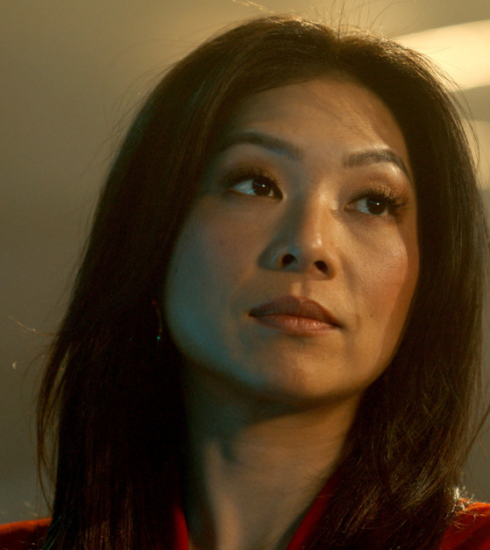Renowned filmmaker Chris Robert Riegel talks latest feature Expectations and the importance of Independent films
I had the pleasure of speaking with renowned filmmaker Chris Robert Riegel about his highly anticipated indie feature Expectations. Expectations is a contemporary satire that serves as a modern-day counterpart to Charles Dickens’ timeless masterpiece, GREAT EXPECTATIONS. This captivating film combines elements of Succession, Knives Out, and Clue, featuring a talented cast including Callan McAuliffe, Blu Hunt, Samuel Arnold, Annie Q. Riegel, and Rina Lipa.
He passionately discussed the significance of independent films and what sets them apart, drawing from his own experience as a filmmaker. The author eloquently explores how his experiences in various countries have influenced his outlook as both an individual and a filmmaker. The conversation was truly enlightening, revealing the vast potential of independent filmmaking.

Cox: Filmmaking is your calling. Where did this enthusiasm come from? How did you start?
Truth be told, I didn’t grow up considering a career in film. I’m not sure if it actually had to do with the notion of it being an unattainable ambition, as much as understanding that my interests were just elsewhere. Playing baseball, riding horses, or exploring the great outdoors abroad, this is where my mind always was when I was younger. As I reached high school age, things began to shift, and I began to understand a little bit more about the communities I got to grow up in, and myself as well. One central theme I always came back to was this idea of the stories we tell. The stories that inspire us when we see someone do well, or the warning tales of someone who maybe made the wrong choices. Understanding how influential these stories could be on my classmates and just how deeply they affected me, led me to understand some of the basic tenants of our society. A good story can inspire someone to stand up and fight for their dreams. Filmmaking for me is the medium for which I get to tell my stories, and they reflect not only the world I’ve grown up in, but the world I hope to see in our present and future.
Cox: How has growing up in Australia, London, and other locations influenced your narrative and storytelling style?
Being internationally influenced has helped me a great deal, and the storytelling aspect is the byproduct. I’ve always looked at my travels at a young age as an absolute gift. Sure, moving around could be difficult, and even now, I don’t get to see all of the people I grew up with regularly as they’re all across the globe. Nevertheless, the benefit I’ve enjoyed for most of my adult life because of these travels is a change in perspective. It’s been so enlightening for me to grow up knowing how different people from different cultures and continents see the world, understand their place in it, and the opinions and tastes that form the basis for their identities. This awareness has manifested itself in my understanding that there’s not just one way to view life, and many times, there’s not only one way to think. This globalized view has helped me feel like I’m a part of something bigger than myself and my own life. Naturally, this has crept into my art and my storytelling. In my upcoming film, Expectations, you’re going to see diverse characters from all across the globe with various accents and intellects vying to inherit the same gargantuan fortune. How they problem solve and think can be very different, but it’s those differences that I hope make the film more enjoyable to watch, and more delightful to explore.
Cox: How would you describe yourself as a filmmaker?
That’s a question that I think I’m still endeavoring to answer! Starting off my career as an executive, then becoming a producer, and now as a creative filmmaker, I guess you could say I’ve had an unconventional and circuitous route to my path. But I’ve relished all of it. By beginning in an unlikely place, my process has allowed me to understand elements that I think I would have otherwise not been aware of, like how to communicate and work with the studio, or how to consider factors like what it means to increase or decrease a budget and offer the respect to the number of shooting days a film or episode might have, and to know what sacrifices must be made or rewards gleaned from such decisions. As I’ve evolved, it’s been my personal mission to grow and change every time I go out there, and that sure does make this job fun. Because if I ever felt like I delivered a perfect film, regardless of my role on it, whether that be as an executive, a producer, or a creative, I’d know that it was time to stop. For my part, there’s always room for improvement, and that empowers me and fuels me. This current stop of my journey with the film Expectations has been a fun one, because I enjoy making films about family and identity while holding up a haphazard mirror to our society. With Expectations, I hope I’ve been able to address all three, amongst some comedic moments, of course.

Cox: Chris, before we talk about Expectations, tell me what makes indie films unique.
I’ve had the luxury and benefit of making both independent and studio films in my career. One of the benefits of studio filmmaking is having the ability to work with a team from start to finish, and be supported by amazing executives, marketing experts, business teams, and talent. In my opinion, they are all artists, and all have significant weight in the decisions that lead to the successfully finished product, which many times is completely planned on a track and augmented from beginning to end. That’s where independent films can differ. My experiences with independent films have revolved around discovery. Many times, when making an independent film, we as filmmakers might not know exactly where the film might end up, who we might partner with for distribution, or even a time frame or promotional structure for when it might premiere. Likewise, I’ve had the pleasure of working on independent films where entire characters are rewritten because an auditioning actor or artist is so inspirational, that the character is found in the very audition room and altered to fit the performance. Likewise, there have been scores of times working in independent film where our talented location managers and production designers have changed entire locations and locales because of the visions and experiences they have, leaving an indelible effect on the resulting production. Both methods within the medium have great value, and both offer great ways to contribute to a satisfactory artistic and audience pleasing experience in my mind.
Cox: Why do indie films matter in filmmaking?
For my part, independent filmmaking and studio filmmaking are two sides of a similar coin. We’ve seen it before, even in the last thirty years of the creative development of the industry. There have been periods where independent filmmaking has driven the types of pictures that studios want to explore or green light, and there have been occasions vice versa where studio films have had a trickle effect on the indie scene with elements from tentpole projects starting trends in indie projects. To me both have value, and support and, dare I say, spot one another as we continue on these creative development cycles over the years. The nice thing about filmmaking is that one side can always feed the other, and both are important as we continue to build fresh new voices and express new and interesting stories that grip our audiences.
Cox: As an accomplished filmmaker, what advice would you give aspiring indie filmmakers?
Something that’s worked for me as I reflect on the earlier portions of my career is the notion that I didn’t rush it. But it’s not patience and time well spent that’s helped me. It’s that, for me, taking that time to get to really understand myself and the reason for why I wanted to tell the stories that I’m telling has been the key. I don’t think I personally would have been ready to fully grasp those aspects a decade ago. Everyone grows at different rates, and I think that’s a good thing. As a result of understanding this about myself, I always ask at the core, what are the values I’m expressing in a script or a narrative. Not all of them have to be a reflection of me, but they all have to reflect the characters and the journey we are sending them on. By being true to my narrative, and having a firm answer as to why I’m telling it and what it means to me personally, I’ve been able to do my best work. I hope all the other storytellers out there can do the same for their creative journeys as well.
Cox: Most independent films struggle to gain backing. What are some ways filmmakers can get funding or at least support?
When I played baseball, one of the things that I learned early on was that there was no negative with putting in the work. I think the same applies to filmmaking. Every film I’ve ever worked on, as an executive, a producer, or now as a creative, has had a unique path of its own. The ones that most often get made and are successful in my experience are the ones that have enjoyed various development cycles and grown to evolve into the finished product we see on screen. When something is well written, and has interesting elements attached to it whether that be filmmaker, on camera or behind the camera talent, I think those are the projects that become difficult for anyone to ignore. I think that starts with passion from the creative vision behind it. I’ve been lucky to have a great support system in the filmmaking community, and finding mentors is one of the very best ways to not only gain experience, but also wisdom and confidence to tell your story. The best way to do that is to begin conversations, online, at forums, or even by attending your local film festivals in the cities or neighborhoods you live in. As a filmmaker who personally loves the festival circuit, there’s a decent enough chance I might see you there at one of them.
Cox: Now for Expectations. Tell me about the film.
Ever want to see a group of orphaned pseudo-siblings come together for a snowed in, holiday weekend retreat at their benefactor’s house where they not only compete with one another for the attention of the mother-figure, but also her multi-million dollar fortune? Throw in the notion that they’re all serial entrepreneurs, and the discovery of a dead body, and there you have it. “Expectations.”

Cox: Describe your creative writing process to bring the story and the characters to life.
This was a ton of fun to write, because first and foremost, Expectations, from what I understand, is the very first companion piece to Charles Dickens’ Great Expectations. I use the term companion piece, because I’ve taken some of the characters and the set-up from the source material, and moved it to the modern day where they meet all new personas and contend with the notion that despite all of our technological and medicinal and sociological advancements, the values between today and the Victorian era might have more overlap than we might think. Bringing Great Expectations into our era with a new and fresh twist was a lot of fun, because, Expectations is a comedy. So it’s definitely a bit of a departure from the psychological drama and trauma of the source material. Furthermore, our audience doesn’t need to be familiar with that source material. There are a few call backs in Expectations that might make a Dickens reader amused, but the goal of creating this companion piece was to bring the set up and narrative to a whole new generation, while asking ourselves, just how far as a society have we gone, and just how far do we have to go yet?
Cox: As the filmmaker, how did you make this film visually appealing to take viewers on a deeper character and storyline journey?
By having this film set in contemporary society, it allowed me to explore a lot more than the comparison of the Victorian era to our society today. It allowed me to throw all tropes associated with Dickens to the wind. Here we get an ample opportunity to not just pretend that we are out of a specific time period, but instead, incorporate visceral elements, props, wardrobes, and production design accumulated over the last one hundred and sixty years, which happens to be right around the time the original source material was first published. In addition to the look and feel of the film, this provides the opportunity for the audience to get inside our characters’ heads, as silly as their inner thoughts might occasionally be, by giving them the opportunity to weigh in with their thoughts and opinions directly to our audience. I’m quite certain that too will produce some laughs. I was really excited to throw in a very modern and artistic color palette that really popped. Without giving anything away, let’s just say some of the colors emphasized are central to the plot, in our visuals. But most importantly, for our audience, my objective is to put them on the ride with our characters as if they are one of the siblings, idling nearby with the hopes of having their business funded or proving their own argumentative point. Think along the lines of a Thanksgiving holiday gone awry.
Cox: Overall, how was creating expectations? Despite your success as a writer and director, did you discover anything new about yourself?
Because I’m determined to grow every time I go out, I can say without a doubt that I’ve discovered quite a bit about myself by making this film. Because of the presence of social media in our lives, we have cause daily to determine what we may or may not want to share with those whom we are connected to, whether they be strangers we just met, or deeply rooted relationships that we’ve known for years. And we do this all by posting a photo or a comment. Interestingly enough, Dickens hinted a bit about this over one hundred and sixty years ago when he wrote Great Expectations. In the source material, Pip is doing everything he can to justify himself as a gentleman in society. He broadcasts a side of himself that he wants everyone to see and accept. But deep within that reservoir of feeling beneath the surface, there are a lot of the problems he’s dealing with. As a late twenty-something year old man by the time we get to my film, in Expectations, the world hasn’t exactly treated him the way he would have hoped. It’s a real case of “be careful what you wish for, because you just might get it.” And Pip is confused, alone, and projecting a lot of things he doesn’t really feel. As a result of creating and crafting these characters and this narrative, I had to do a deeper dive into understanding the reason why we all project and what that says about us as people. For myself, it’s understanding that it’s all right to be vulnerable. By giving myself that permission, I think I not only got to write characters that get to show all of their sides to our audience in this film, but I’ve also come to realize just how important it is to express that notion in my own day to day life.






